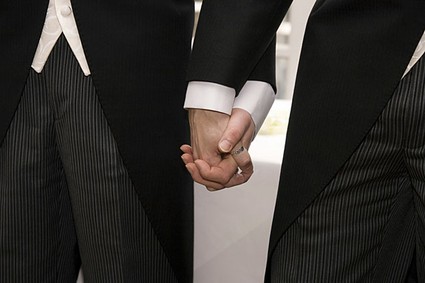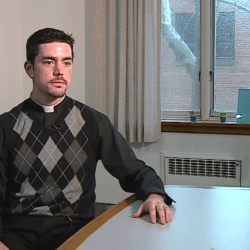Actually, I’ll let Brandon Vogt do it. He lays out 10 common arguments in favor of same-sex marriage, and then deftly deflates them in Our Sunday Visitor. As Brandon points out:
“This is not an attack on people with same-sex attractions. All people, regardless of sexual orientation, deserve to be treated with dignity and respect. Instead, this article is a rational look at whether civil marriage, an institution that touches all people and cultures, should be redefined.”
Here’s his first three:
1. Marriage has evolved throughout history, so it can change again.
Different cultures have treated marriage differently. Some promoted arranged marriages. Others tied marriage to dowries. Still others saw marriage as a political relationship through which they could forge family alliances.
But all these variations still embraced the fundamental, unchanging essence of marriage. They still saw it, in general, as a public, lifelong partnership between one man and one woman for the sake of generating and raising children.
This understanding predates any government or religion. It’s a pre-political, pre-religious institution evident even in cultures that had no law or faith to promote it.
Yet, even supposing the essence of marriage could change, would that mean it should? We know from other areas of life such as medical research and nuclear physics that just because you can do something doesn’t mean you ought. After all, such action may not be ethical or serve the common good. Even if this argument had historical basis, it would not necessarily be a good reason to change the meaning of marriage.
2. Same-sex marriage is primarily about equality.
This argument is emotionally powerful since we all have deep, innate longings for fairness and equality. Moreover, history has given us many failures in this area, including women banned from voting and African-Americans denied equal civil rights. The question, of course, is whether same-sex couples are denied equality by not being allowed to marry each other.
To answer that, we first must understand equality. Equality is not equivalency. It does not mean treating every person or every group in exactly the same way. To use an analogy, men and women have equal rights, but because they significantly differ they require separate restrooms. Equality means treating similar things similarly, but not things that are fundamentally different.
Second, there are really two issues here: the equality of different people and the equality of different relationships. The current marriage laws already treat all people equally. Any unmarried man and unmarried woman can marry each other, regardless of their sexual orientation; the law is neutral with respect to orientation just as it ignores race and religion.
The real question is whether same-sex relationships differ significantly from opposite-sex relationships, and the answer is yes. The largest difference is that same-sex couples cannot produce children, nor ensure a child’s basic right to be raised by his mother and father. These facts alone mean we’re talking about two very different types of relationships. It’s wrong, therefore, to assume the state should necessarily treat them as if they were the same.
Same-sex marriage advocates may argue that it’s discriminatory to favor heterosexual spouses over homosexual couples. With all of the benefits flowing from marriage, this unfairly endorses one set of relationships over another. But if the state endorsed same-sex marriage, it would then be favoring gay “spouses” over unmarried heterosexual couples. The argument runs both ways and is ultimately self-defeating.
3. Everyone has the right to marry whomever he or she loves.
Though catchy, few people truly believe this slogan. Most of us acknowledge there should be at least some limitations on marriage for social or health reasons. For example, a man can’t marry a young child or a close relative. And if a man is truly in love with two different women, he’s legally not allowed to marry both of them, even if both agree to such an arrangement.
To put it simply, in the eyes of the state, marriage is not about adults; it’s about children. Claiming a “right to marry whomever I love” ignores the true emphasis of marriage. So, the real question here is not whether marriage should be limited, but how. To answer that, we must determine why the government even bothers with marriage. It’s not to validate two people who love each other, nice as that is. It’s because marriage between one man and one woman is likely to result in a family with children. Since the government is deeply interested in the propagation and stabilization of society, it promotes and regulates this specific type of relationship above all others.
Notice that nobody is telling anyone whom he or she can or cannot love. Every person, regardless of orientation, is free to enter into private romantic relationships with whomever he or she chooses. But there is no general right to have any relationship recognized as marriage by the government.
Read it all. It addresses common accusations of bigotry, homophobia, civil rights and more. (Note: his discussion focuses purely on civil marriage and he bases his arguments on biology, reason and history—not theology.) After you read it over, you may want to keep it handy. I have a feeling we as a country, and as a church, will be talking about this a lot in the months to come.
Meantime, in related news, the cardinal archbishop of Chicago has launched a campaign against same-sex marriage in Illinois. Read what he had to say here.












